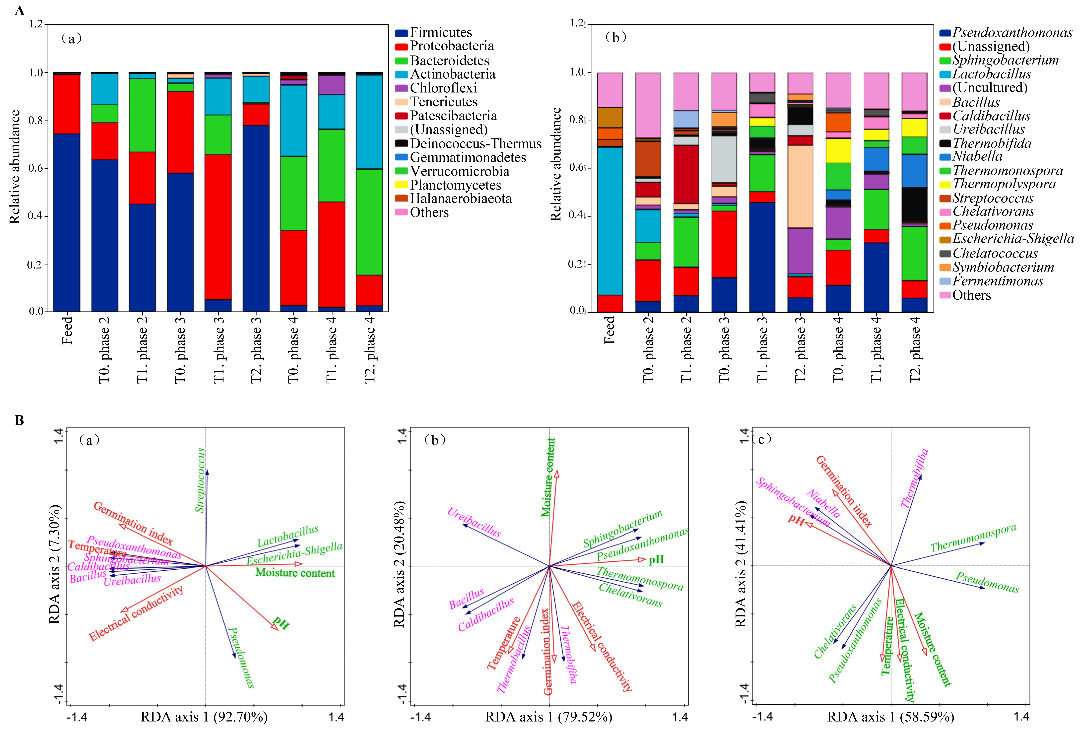南湖新闻网讯(通讯员 孙孝文)近日,我校生命科学技术学院、农业微生物资源发掘与利用全国重点实验室微生物生物技术课题组在国际学术期刊Bioresource Technology上发表了关于利用微生物菌剂促进樟树园林废弃物资源化利用的最新研究成果。论文以“Dynamic composting actuated by a Caldibacillus thermoamylovorans isolate enables biodecomposability and reusability of Cinnamomum camphora garden wastes”为题,报道了利用一株高温好氧微生物菌剂通过解除樟树园林垃圾中生态毒性物质的抑制作用以及高效降解木质纤维素,促进了樟树园林垃圾的好氧堆肥腐熟,达到了其资源化再生利用的效果。
在中国南方,樟树是最广泛种植的城市常绿树种之一,因此在城市园林垃圾中会存在大量的含有樟树园林废弃物的生物质废物。堆肥转化被认为是一种成本低和环境友好的园林废物处理方法。然而,樟树的园林垃圾含有一些生态毒性的化学物质会对各种微生物的生长和发酵代谢有明显的抑制作用,从而抑制堆肥过程中的生物质转化。因此,针对樟树生物质转化经济有效的园林绿化废弃物堆肥腐熟技术具有重要的实用意义。

图1. 加入MB12B菌剂改变了堆肥基质微生物群落结构、减少了有害微生物生长和促进基质的腐熟
课题组利用一种以野生型细菌Caldibacillus thermoamylovorans MB12B驱动的动态樟树园林垃圾-餐厨垃圾堆肥系统,不仅可高效分解樟树园林垃圾和木质纤维素,而且解除了樟脑园林废弃物中生态毒性物质对堆肥系统中微生物的抑制作用,促进了堆肥基质转换速率提升,堆肥嗜热期温度提升明显,并提升腐殖质形成量44%以上。此外,MB12B菌剂加入后,堆肥过程中CH4和NH3的排放减少了61.9%和37.6%。在实验室盆栽试验证实,堆肥制品在黑麦草盆实验中明显地促进了黑麦草的生长,其制品性能也达到国家有机肥料标准NY/T 525-2021的要求。
我校生命科学技术学院博士生孙孝文、硕士生李哲为论文第一作者,李林教授为通讯作者。该研究得到国家自然科学基金(32170124)和广东省农村振兴战略专项基金(2021A0305002)的资助。
【英文摘要】
The ecotoxic substances in Cinnamomum camphora garden wastes (CGW) often restrain microbe-driven composting process. Here, a dynamic CGW-kitchen waste composting system actuated by a wild-type Caldibacillus thermoamylovorans isolate (MB12B) with distinctive CGW-decomposable and lignocellulose-degradative activities was reported. An initial inoculation of MB12B optimized for temperature promotion and rapid fermentation with reduced emission of CH4 and NH3 by 61.9% and 37.6%, respectively, increased germination index and humus content by 18.0% and 44.1%, respectively, and reduced moisture and electrical conductivity, and all were further reinforced by reinoculation of MB12B during the cooling stage of composting. High-throughput sequencing showed varied bacterial community structure and abundance following MB12B inoculation, with temperature-relative Caldibacillus, Bacillus, and Ureibacillus, and humus-forming Sphingobacterium emerging to dominate abundance, which strongly contrasted with Lactobacillus (acidogens related to CH4 emission). Finally, the ryegrass pot experiments showed significant growth-promoting effectiveness of the composted product that successfully demonstrated the decomposability and reuse of CGW.
论文链接:https://doi.org/10.1016/j.biortech.2023.128852
审核:李林
